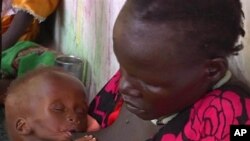The number of children suffering from severe malnutrition in South Sudan has doubled to 229,000 as 13 months of armed conflict have led to food shortages and prevented aid workers from reaching people in need, the U.N. Children's Fund (UNICEF) said Wednesday.
"Based on the latest Integrated Food Security Phase Classification (IPC) group of experts’ report released this week, the ongoing conflict is sharply reducing food supplies and slowing humanitarian access to those who most need assistance," UNICEF said in a statement.
UNICEF says that of the 1.9 million people who have been displaced by the fighting in South Sudan, 748,000 are children. The number of displaced is growing as more people leave their homes to look for food, UNICEF and the IPC said.
The IPC places much of the blame for South Sudan's dire food insecurity on fighting that has brought a steep rise in the prices of staple foods.
"In the worst affected counties... as much as 80 percent of the population was unable to cultivate staple crops in the last agricultural season and staple foods remain limited in many local markets," the report said.
The U.N. children's agency said food insecurity is at its worst in parts of South Sudan that have borne the brunt of the fighting -- Jonglei, Unity and Upper Nile states. The IPC report says food insecurity has also increased since September of last year in Lakes and Warrap states because of "unprecedented levels of inter-clan conflict and cattle raiding" and flooding.
Insecurity and accessibility
The fighting has prevented UNICEF and other aid agencies from reaching parts of South Sudan where people need help.
"UNICEF needs access to remote areas made inaccessible because of the fighting,” said Jonathan Veitch, the UNICEF representative in South Sudan. “This is where the crisis is forming. Both parties to the ceasefire need to reach a long-term settlement or face a growing food crisis by the end of the dry and lean season."
Veitch said failure to reach a peace deal would have disastrous consequences in South Sudan, and especially for the country's children. “Any increase in violence will see supply routes cut, markets disrupted and humanitarian access denied. This would be catastrophic for acutely malnourished children and could quickly lead to high levels of mortality.”
President Salva Kiir and rebel leader Riek Machar on Monday signed a power-sharing deal, but the agreement still needs to be fleshed out. The Intergovernmental Authority on Development (IGAD) that has been trying broker peace in South Sudan for the past 13 months, has given the two sides until March 5 to settle remaining differences and reach a final peace deal.
Karin Zeitvogel contributed to this article.




